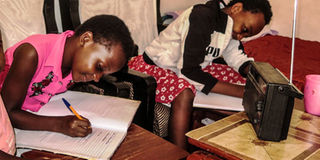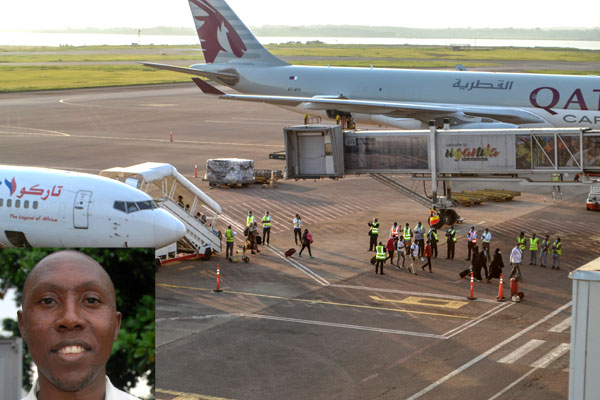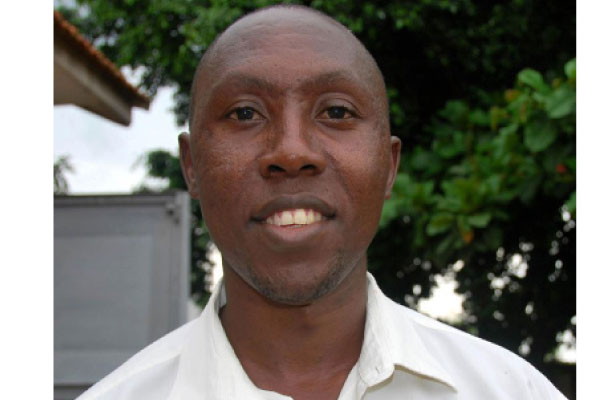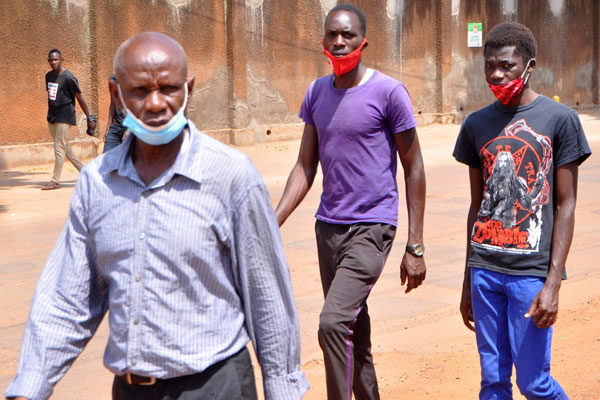Lockdown: Schools brace for dead year

Sisters Sheena Atukunda and Shalom Aturinda of Little Angles Primary School in Ntungamo District take lessons via a radio set at their home on Monday afternoon. PHOTO/ PEREZ RUMANZI.
What you need to know:
- Multiple sources in the Ministry of Education talked of “false hope” given to learners in order to keep revising and asked schools, as well as parents, to brace for a dead year
Stakeholders in the education sector have asked authorities in the Ministry of Education, learners in candidate classes, as well as their parents, to accept reality and forget about any form of exams this year.
Multiple sources in the Ministry of Education talked of “false hope” given to learners in order to keep revising and asked schools, as well as parents, to brace for a dead year.
Government officials, as well as head teachers, have also revealed that it will be practically impossible for candidates to sit exams this year as planned because a lot of study time has been lost and it will be impossible to conduct the end of cycle examinations by Uganda National Examinations Board (Uneb).
The head teachers, under their umbrella the Association of Secondary School Head Teachers of Uganda (ASSHU), told Daily Monitor in interviews yesterday that it will be impulsive to talk about examinations before they even establish when the schools will re-open.
Lost time
Mr Martin Okiria Obore, the ASSHU chairperson, explained that they have already lost of time when schools were abruptly closed in March over coronavirus outbreak before concluding first term.
“What we would be talking about practically would be reopening of schools before we even talk about exams. If schools have not opened, it is far-fetched to talk about Uneb. I saw a communication from the public relations [Uneb], I think she is sowing hope so that students keep revising. But practically to have Uneb this year, is impossible. A lot of time has been lost,” Mr Obore said.
A head teacher based in Ntungamo District, who requested not to be identified in order to speak freely, said there are a number of activities which Uneb should have done by this time but haven’t started on because of coronavirus pandemic.
For example, he noted that registration of candidates, which would have been completed by this time, has not yet taken place and it is not clear when it will take place.
Registration enables Uneb to establish how many candidates are sitting for the different examinations it administers at primary and secondary levels.
Also, while examiners applied to participate in marking this year’s examinations, they have not received a response from the exam body.
According to sources in the Education ministry, although Uneb has a question bank, it cannot use them before students complete the syllabus.
“We are not certain of the future. We are looking at this year as a dead year, although not yet officially declared. We see it not easy for Uneb to give candidates exams this year. Uneb cannot definitely set some substandard exams. It must match with the syllabus. Uneb considers syllabus coverage when setting exams. That is where the dilemma is,” the source said.
“What kind of examination will Uneb set to suit the time that the learners were at school or what the teachers had covered? Can they consider that? They will not. Otherwise, if they do, it will mean they are producing half-baked people. If it is to do it, they have to extend examinations to next year so that they can cover the time lost.”
But Mr Filbert Baguma, Uganda National Teachers’ Union (Unatu) secretary said all is not lost until September.
According to Mr Baguma, if schools will not have reopened by October, then the country should embrace for a dead year. He also proposed extension of the customary terms to February next year to enable learners catch up on the lost time. The extension is only tagged on opening of the schools in September.
Other stakeholders, however, said re-opening schools in September or October will be a joke since the government will need more time to discuss ways of ensuring safety of learners in the face of a the deadly pandemic.
Mr Baguma, however, warned that it would take government another three years to readjust the school calendar to the old timetable by gradually reducing holidays.
“It is still possible because we are in June and time lost can be compensated if we extend third term to next year,” Mr Baguma said, adding: “That will create room such that going forward for the next three years, they keep on adjusting what has been our normal school calendar and take care of the time that has been lost due to Covid-19. That is possible if we can get schools reopened in September. But if we go beyond October, that will be impossible. It becomes complicated.”
Uncertain
State Minister for Primary Education, Ms Rosemary Seninde, yesterday said exams will depend on when government will reopen schools.
“I know at one time we shall be able to open schools. The question is when. As we wait for the answer, we must ensure that our children are engaged. We must not forget that we are now in the new normal. We have no choice but to adjust,” Ms Seninde said.
Asked whether there will be any exams this year, including for learners in non-candidate classes, Ms Seninde responded without disclosing details of the government plan for the education sector.
READ
“I know at one time, whether it is at the end of this year, or early next year, whenever assessment may be done, it will still happen,” Ms Seninde said.
“All we need to know is that we have been affected by Covid-19 and the lockdown. We must also appreciate that our calendars will also change depending on when we will have our schools reopened even if it comes to assessment at candidate level,” she added.
The Uneb executive secretary, Mr Dan Odongo, wasn’t available for a comment by press time.
Mr Alex Kakooza, the Education ministry Permanent Secretary was also unavailable for a comment by press time.
President Museveni said on Tuesday that it was risky to reopen education institutions but promised to launch a distance learning programme and provide free radios and TV sets to homesteads to facilitate continuous learning during the lockdown.
Two weeks ago, Foreign Affairs Minister Sam Kutesa went to Cabinet and proposed a dead year for schools. Other ministers, however, rejected the proposal and backed the President’s idea of buying radios and TV sets to support distance learning without any clear plan for end of year.






